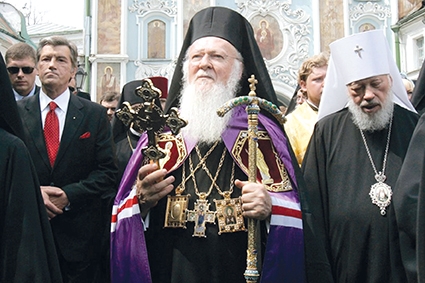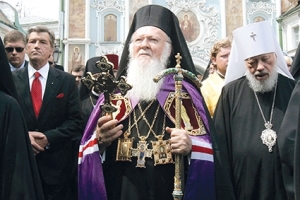Whose Side Are We on?
Op-Ed
Will Ukraine be punished for restoring the historical justice? This is the most crucial question for the Orthodox community today. After Bartholomew I, the current Archbishop of Constantinople and Ecumenical Patriarch, granted autocephaly to the Ukrainian Orthodox Church, Moscow terminated relations with the Ecumenical Patriarchate of Constantinople, by doing so the religious confrontation turned into a political one and if the situation continues to escalate, there is a possibility that the world will witness a new war. Everything now depends on the Kremlin and the decision of President Putin: will he start a war against Kyiv in the name of God?
The Kremlin Press Secretary, Dmitry Peskov, declared that Russia has always protected the interests of Russians and the Russian-speaking community and will continue to do so even in Ukraine. After losing Ukraine politically, Putin is now losing it in the religious sense too. This could be translated as a threat to Russian Imperialism and the myth of Putin’s almightiness. A crucial thing in this whole story is that Putin is being defeated not by the US and its economic and military power, but by one elderly Church leader who resides in Istanbul, and whose single signature proved enough to separate 605 sq.m. and a parish of 40 million people from the canonical borders of the Moscow Patriarchate. Russia did not see a loss of this size even when it declared itself defeated in WWI and signed the capitulation in Brest-Litovsk. The Russian Church’s answer to this “catastrophe” thus far is terminating relations with the Ecumenical Patriarchate and hoping that other Orthodox countries, including Georgia, will show their support.
Quite recently, the Press Division of the Georgian Orthodox Church published a statement from the Patriarch of all Georgia Ilia II, saying that he is waiting for the conclusion of the canonical process about the recognition of Ukraine’s autocephaly and will voice his position only afterwards: “It is necessary to refrain from preliminary assessments until the final positions are announced by Archbishop of Constantinople and the Russian Church, which should be based on the norms of canonical legislation.”
The Patriarch of Georgia was never distinguished for making harsh statements and this statement suggests that the Georgian Church hasn’t decided on its position yet, especially with regards to the issue of the property of the Ukrainian Church, which in fact is the most crucial issue in this unprecedented historical controversy.
There are 14 Orthodox autocephalous churches and the majority of theologists believe that of these, Antioch, Bulgaria, Romania and Georgia are in the so-called “team Russia.” In the recent issues with Ukraine, however, none of the latter, apart from Antioch, have shown their support for Russia, which came as a great surprise. What is happening in the other churches, and why they refrain from supporting Russia openly, is not known, but what we do know is that the situation in the Georgian Church is quite fragile.
The influence of the Russian Church on Georgian religious leaders is rather strong; however, the situation is varied at the level of hierarchies and episcopacies. Many bishops view the current situation quite pragmatically, and their varied positions could be the reason Georgia is not showing its open support to Russia.
The attitude of the Georgian Patriarchate is balanced by the position of these religious leaders and nobody knows which wing will win, especially taking into account the fact that earlier this year, Georgia at first confirmed its attendance at the Historic Orthodox Christian summit, then two days before the actual event declared it wouldn’t go, thus finding itself on the side of those who supported Russia and joining the protest of the Russian Patriarchate.
By Zaza Jgarkava
Ecumenical Patriarch Bartholomew I of Constantinople in 2008. CreditMykhailo Markiv/Reuters












